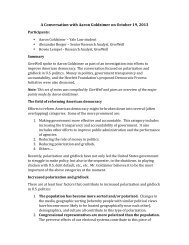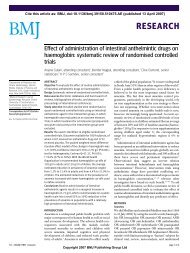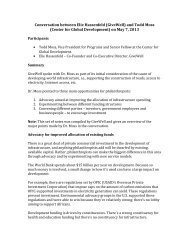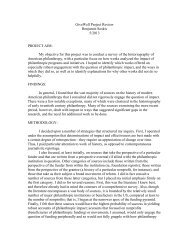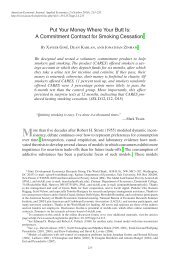Getting In Staying On Moving Up - GiveWell
Getting In Staying On Moving Up - GiveWell
Getting In Staying On Moving Up - GiveWell
You also want an ePaper? Increase the reach of your titles
YUMPU automatically turns print PDFs into web optimized ePapers that Google loves.
GETTING IN, <strong>Staying</strong> on, <strong>Moving</strong> <strong>Up</strong> 27<br />
bers struggle constantly to manage. Of the<br />
50 to 60 clients in each career advisor’s<br />
caseload, roughly one-third typically need<br />
intense personal attention, another onethird<br />
are highly motivated and can function<br />
with more routine contact, and onethird<br />
fluctuate somewhere in between,<br />
needing more attention at some times, less<br />
at others. Balancing these time demands<br />
with the job’s other responsibilities and<br />
their own private time is a critical skill for a<br />
successful career advisor.<br />
<strong>On</strong>ce students are working, the crucial follow-up<br />
contact with career advisors can present<br />
a host of time problems: clearly, these<br />
contacts cannot interfere with the client’s<br />
job, but they should not take up the career<br />
advisors’ personal evening hours either.<br />
VFI’s solution to this problem has become<br />
a cornerstone of its job-retention strategy:<br />
7.<br />
<strong>On</strong>ce students are employed,<br />
incorporate the program’s services<br />
into the rhythm of their workday,<br />
so staff can provide effective<br />
support without disrupting the job.<br />
<strong>In</strong> the first six months after placement,<br />
career advisors routinely take working<br />
clients to a “business lunch” during<br />
their normal midday break. Clients appreciate<br />
the chance to compare notes with their<br />
advisors—and get a free meal in the bargain.<br />
And the advisors can hear their<br />
clients’ thoughts, concerns and reactions<br />
“while the workday is still at the front of<br />
their minds,”as one career advisor put it.<br />
These lunches are just one of several techniques<br />
for adapting <strong>Moving</strong> <strong>Up</strong>’s postplacement<br />
services to the clients’ work day<br />
and emphasizing that the demands of the<br />
job come first. VFI also conducts workshops<br />
or GED classes for working clients after<br />
business hours. And career advisors are on<br />
call, by pager, 24 hours a day.<br />
Giving effective advice often requires<br />
career advisors to have an independent<br />
sense of the workplace, the employer and<br />
the job. Yet most employers and supervisors<br />
do not have time for “counseling sessions”<br />
with career advisors, and respecting<br />
employers’ time is essential for maintaining<br />
VFI’s job pipelines. Therefore, the program<br />
has evolved a balanced strategy for getting<br />
to know employers’ needs while staying out<br />
of their way:<br />
8.<br />
Cultivate employers whose<br />
requirements you understand, and<br />
use every opportunity, no matter<br />
how brief, to learn something more<br />
about the company and its<br />
industry.<br />
VFI begins by concentrating on a<br />
few industries, especially hospitality, in<br />
which it already has significant experience<br />
and can give its students a competitive,<br />
industry-driven curriculum of training. It<br />
then uses brief meetings with employers,<br />
whatever industry they are in, to gauge<br />
their needs and to learn more about the<br />
requirements of the job. As VFI cultivates<br />
more and more “repeat business” with<br />
these employers, its knowledge base<br />
grows—both for preparing new job candidates<br />
and for counseling those already<br />
placed in these jobs. As a result, career



